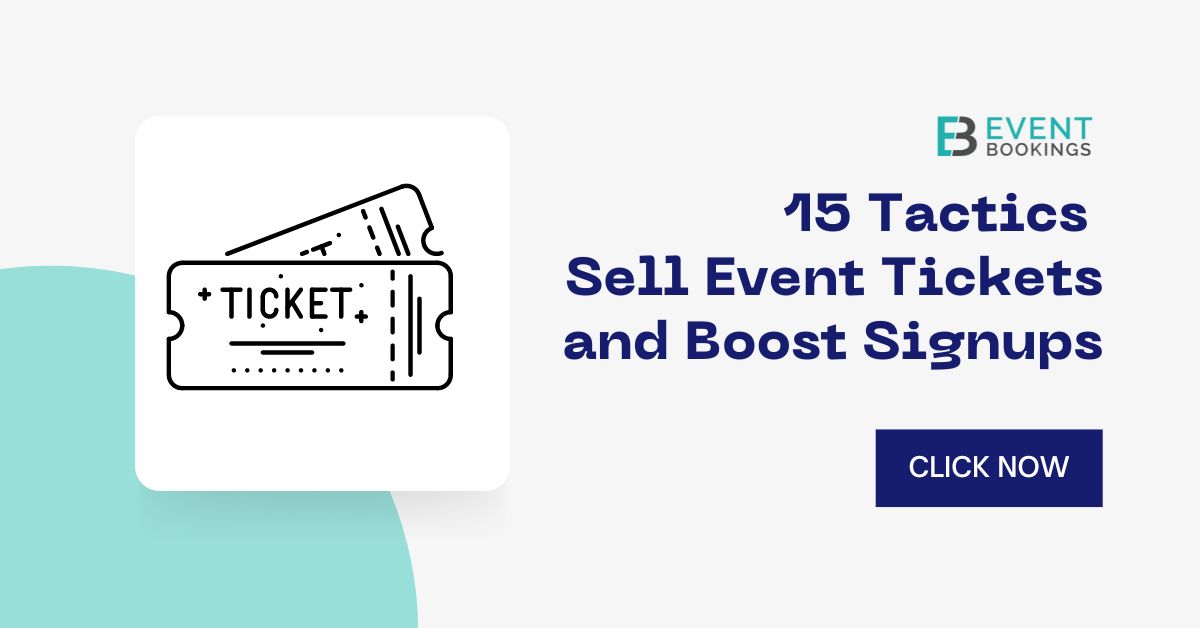The key to any event’s success is its ability to draw in and develop a loyal audience to whom tickets may be sold. Precisely 40% of marketers who sell event tickets, as well as salespeople, believe that locating new customers is the most challenging aspect of their work.
Furthermore, 36% of respondents stated that the actual transaction is even more difficult. For this reason, online ticketing has emerged as a crucial tool for event planners in the digital era, offering them a worldwide audience, efficient transaction processing, and the ability to get insightful attendee data.
Are you planning an event and trying to find efficient ways to increase registration and find answers on how to sell tickets for your event? You’ve arrived at the ideal destination. In this post, we’ll look at 15 strategies that will help you increase event ticket sales using online platforms. These strategies are meant to generate interest, improve website traffic, and eventually raise registrations—whether you’re organising a hybrid, online, or in-person event.
So, lets look at the 15 most effective strategies that will boost up you online ticket sells and number of registrations.
1. Creating a Compelling Event Page

Creating a compelling event page is essential for selling tickets and boosting registrations online. Start by using an attention-grabbing headline that clearly explains what the event is about. Include important details, such as the date, time, location, and any special guests or features, to entice potential attendees. Use high-quality, clear images and videos to showcase what participants can expect. A clear call-to-action button, like “Register Now,” should be easy to spot, encouraging visitors to sign up. Make the page mobile-friendly and ensure it loads quickly so users don’t abandon it before completing their Registration.
2. Leveraging Social Media

Social media platforms are a great way to sell tickets and promote your event because they have a large audience base. Use all the popular social media platforms like Facebook or Twitter to distribute links for Registration, captivating content, and event updates. Make the most of the exposure of your social media postings by including relevant hashtags, engaging text, and visually appealing images. Utilise Twitter’s video features as well to produce exciting and captivating videos that will draw in viewers. To expand your audience and boost ticket sales, think about implementing customised ads.
3. Email Marketing Strategies
An efficient way to promote events and increase ticket sales is through email marketing. Create a prospective attendee email list and use targeted email marketing to grow the list. Create a sense of exclusivity and urgency by sending out personalised invitations, event updates, and unique deals. By using email automation, you can streamline the process of sending these updates and ensure timely delivery to your audience. To convince recipients to click through and purchase tickets, use persuasive copywriting and eye-catching images.
4. Utilise Early Bird Discounts
Offering early bird discounts and promotions is a great way to inspire people to register for your event early as everyone loves discount. Give these unique offers a deadline to create a sense of urgency. Early bird pricing encourages people to purchase tickets in early and contribute to the excitement and buzz surrounding your event. You can also offer special promotions, like group discounts or VIP packages, to attract more attendees. Promote these offers through email, social media, and your event page to maximise their reach.
5. Collaborate with Influencers and Partners

Collaborate with industry professionals and influencers in the niche of your event to maximise their impact. Ask them to participate in panel discussions, give a speech at your event, or post about it on social media. Their support and involvement can greatly increase the credibility of your event and draw in more attendees. Consider influencer marketing as one strategy that has proven results. By utilising their networks and platforms, you’ll be able to include new audiences and build trust with potential attendees, ultimately driving more registrations.
6. Run Paid Advertising Campaigns
Accepting paid advertising campaigns is an effective way to reach a larger audience and boost event ticket sales. Platforms like Google Ads, Facebook, and Instagram allow you to target audiences from specific demographics, interests, and behaviours. This overall ensures your event reaches the right people. Set a budget and create engaging ads that highlight the main event details, such as the benefits of attending or any limited-time offers like early bird discounts. Use eye-catching visuals and a strong call to action to encourage immediate registrations. Regularly monitor your campaign performance, adjust, enhance results and maximise your return on investment.
7. Search Engine Optimisation (SEO)
SEO is one of your marketing’s most effective strategies. Your website can draw in more natural visitors, become more visible, and eventually sell more event tickets if it is optimised for search engines. Focus on producing worthwhile material and get knowledgeable about locating keywords associated with your event if you want to fully utilise SEO. Include these keywords in your blog articles, landing page copy, and event descriptions on your website in a natural way.
8. Provide Multiple Payment Options
Offering multiple payment options is a necessity for making the registration process smooth and accessible for all attendees. Choose a ticketing software that allows a variety of payment methods, including PayPal, credit/debit cards, and mobile wallet options. This flexibility accommodates different preferences and ensures no one abandons the registration due to limited options. For international events, consider including global payment systems and currency options to cater to a wider audience. Additionally, ensure the payment process is secure and user-friendly, minimising any friction that could prevent potential attendees from completing their purchases.
9. Create Scarcity and Urgency
Limiting the number of seats, VIP packages, or add-on experiences would encourage individuals who are unsure to purchase now rather than later, which is the type of scarcity you can create. First-row seats at live performances and restricted early bird tickets for conferences are two examples of quantity scarcity in event ticket sales. Moreover, visitors to your event ticket website who have an unlimited amount of time to make up their minds are also less likely to convert. For this reason, you may influence prospects by using display clocks or explicitly stating the sales end time or date on your website.
10. Customer Support and Experience
A seamless customer support system plays a vital role in enhancing the attendee experience and fostering trust. Ensuring that attendees can easily find help through online live chat, email, or a phone call supported by a business VoIP solution is a must for solving any concerns they may have during the registration process. An informative FAQ section can also pre-emptively answer common questions, which reduces the need for direct inquiries. It’s equally essential to streamline the user experience, making it simple and intuitive from start to finish.
11. Retarget Interested Audiences
Retargeting is a powerful tool for capturing those who have shown interest but haven’t completed their registration. Use retargeting ads on platforms like Google or social media to remind visitors of your event and encourage them to finalise their purchase. You can show them tailored ads featuring event highlights, early bird discounts, or limited-time offers to reignite their interest. Sending follow-up emails to users who started the registration process but didn’t finish is another effective strategy. By staying on their radar, you keep your event top-of-mind and turn them into confirmed attendees.
12. Create Engaging Content
In the digital world, making your content and internet presence exciting and popular is becoming more and more critical. Among other content, videos are becoming a popular medium. So, make engaging clips that include behind-the-scenes footage, testimonials from past participants, and the highlights of your event. Use these videos to create buzz and encourage prospective attendees to buy tickets by sharing them on your website and on social media sites like YouTube, Instagram reels, TikTok, and email newsletters.
13. Host Pre-Event Webinars or Livestreams
By holding webinars and live sessions prior to the event, you may establish yourself as an authority in the field and increase interest in your event. You can communicate with prospective guests during these interactive sessions, respond to their enquiries, and share insightful information about your event. Use your email newsletters, social media accounts, and website to advertise these sessions in order to draw in potential ticket purchasers.
Read More:
14. Implement Referral Programs
Word-of-mouth marketing is highly strong. Encourage participants to tell others about your event by putting referral procedures in place. Reward attendees who encourage friends, co-workers, or social media followers to sign up for your event with discounted tickets or other benefits. By using peer referrals, this method not only increases ticket sales but also broadens the event’s audience.
15. A/B Testing and Optimisation
Last but not least, an essential tactic for refining your event marketing efforts is A/B testing and optimisation. By testing different versions of your event page, email campaigns, or ads, you can identify which elements perform best. Analysing the results allows you to make data-driven decisions that improve your overall strategy. Regularly optimising your campaigns based on these insights helps ensure you’re continually enhancing your approach.
Last Words
Getting people invested in your event takes some creativity, but seeing your room filled with energised attendees is well worth the effort. In conclusion, we would suggest you be confident about trying new promotional tactics. As events are constantly evolving, so your marketing approach should, too.




